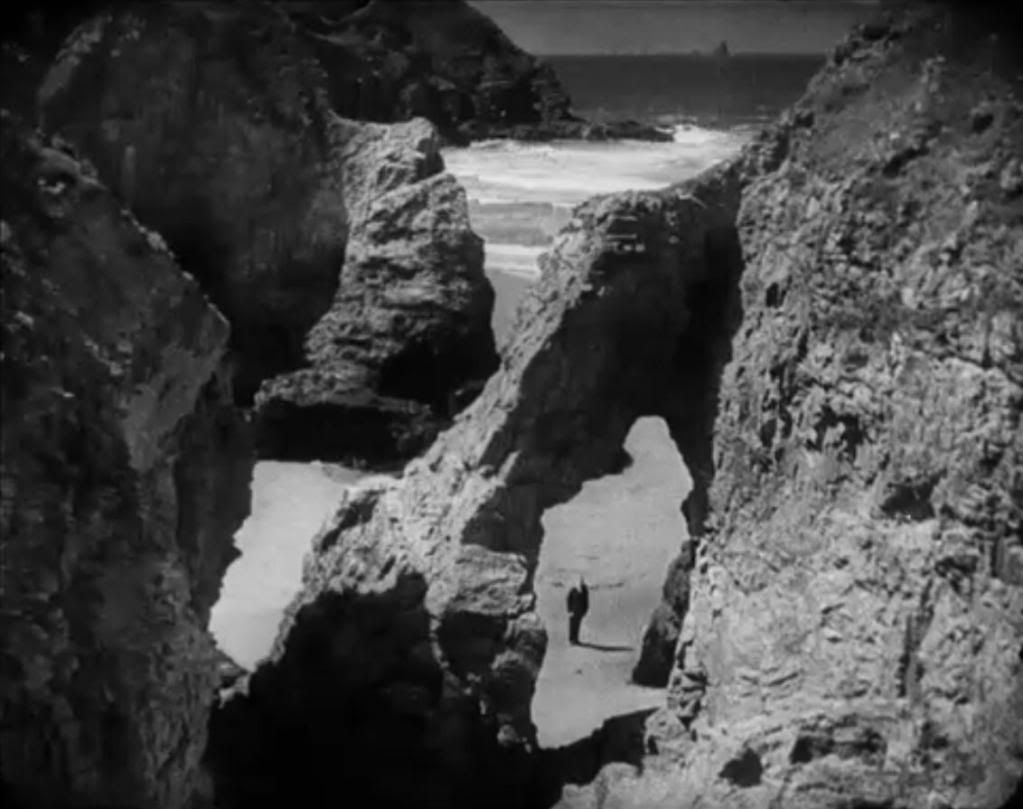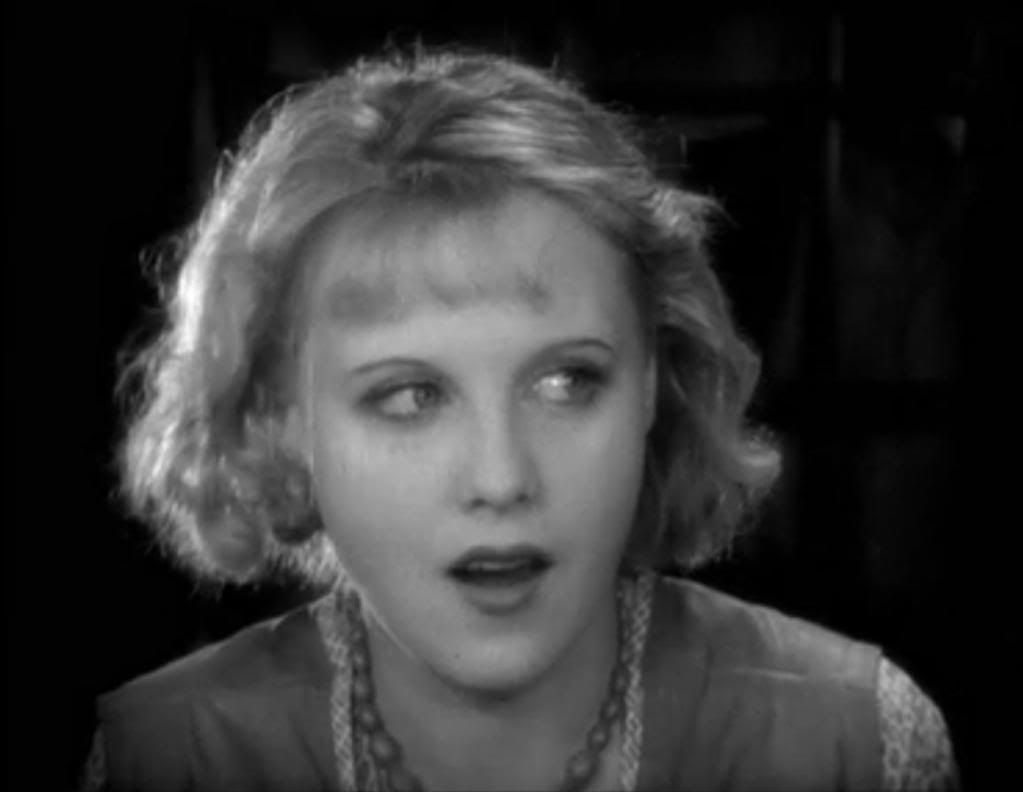 [This post is a contribution to the third annual For the Love of Film blogathon and fundraiser, which will be running from May 13-18. This year, hosts Marilyn Ferdinand, Farran Smith Nehme and Roderick Heath have dedicated the week to Alfred Hitchcock, whose early (non-directorial) work "The White Shadow" will be the beneficiary of any money earned during the event. Be sure to donate!]
[This post is a contribution to the third annual For the Love of Film blogathon and fundraiser, which will be running from May 13-18. This year, hosts Marilyn Ferdinand, Farran Smith Nehme and Roderick Heath have dedicated the week to Alfred Hitchcock, whose early (non-directorial) work "The White Shadow" will be the beneficiary of any money earned during the event. Be sure to donate!]The Manxman was Alfred Hitchcock's final silent film, since his next production, Blackmail, was belatedly transformed into a sound film part-way through its filming. This film is a rather conventional melodrama, centered around a predictable and rather bleak love triangle of the kind that was very popular in 1920s and 1930s melodramatic cinema. The fisherman Pete (Carl Brisson) and the lawyer Phil (Malcolm Keen) are childhood best friends who have stuck together for years, but their relationship is compromised when both of them fall in love with Kate (Anny Ondra), the daughter of the local tavern owner. They both love her, but Phil leaves his love unspoken and even grudgingly helps Pete woo the girl, at least until Pete sets off on an adventure, trying to make his fortune in foreign trade so that he can return, impress Kate's surly father (Randle Ayrton) and marry her. Predictably, while he's away, Phil and Kate fall in love, and when they get a message saying that Pete has died at sea, they think they're free to have their own relationship at last, even though Kate had somewhat frivolously promised herself to Pete before his departure. But of course Pete isn't dead, and when he returns Phil pushes his love back into the arms of the man she doesn't want, with predictably tragic results.
It's the typical kind of vaguely homoerotic love triangle film where the guys seem more interested in each other than the girl they're ostensibly vying for, the kind of story that Howard Hawks always infused with rich subtextual substance. Hitchcock doesn't seem as interested in that subtext, though of course it's readily available for plumbing anyway, intrinsic to the story and the constant emotionally charged glances between the two leads. The beats of the story are familiar and well-trod, with perhaps a few more tragic twists than usual.
The cast does little to set this rote melodramatic material apart from the countless similar movies made around this time. Brisson, especially, is dead weight, seemingly capable of little more than grinning into the camera, his eyes sparkling, his face broad and dumb. In comparison, Keen fares much better, overacting just a touch at times, and Ondra is charming and sprightly, bringing such a spark of mischief and playfulness to this girl that it's seldom clear if she's taking things seriously or not. This quality of her performance takes on a new and dark significance towards the end of the film, when, finally leaving Pete, she also leaves behind, unattended, their baby, which is laying in a crib by the fireplace when Pete returns home to find his wife gone.

Working with a tired plot and a somewhat inconsistent cast, Hitchcock elevates the material a bit with his elegant style. When Phil first gets the news that Pete has died, he's walking through the darkness, the town's lighthouse periodically casting a spotlight across him as it revolves past, and suddenly Hitchcock dissolves from a shot of Phil alone to one of him surrounded by people, clustered in the darkness around the local tavern, the Manx Fairy. The dissolve makes it seem as though the others have suddenly materialized from nowhere all around him, infiltrating his privacy, their sudden appearance in the otherwise empty streets indicating that something has gone very wrong. Hitchcock also finds an incredible location to stage the scene where Phil tells Kate that Pete isn't dead after all, as the two lovers meet on a rocky beach. Kate scrambles over the rocks in a dramatic long shot, framed against the horizon with the sun peeking over the rocks behind her, and when she gets to the beach she looks down at Phil from a distance, framed by a striking oval rock formation that surrounds his tiny form. The ragged, harsh terrain separates the lovers, just as soon they'll be torn apart by Pete's return — which is signified, throughout this scene, by the steam emanating from a boat out on the water, carrying the lost seafarer back to break up this relationship.
Soon, Pete and Kate are getting married, mainly because Phil, ultimately more interested in his friend and his law career than the girl, pushes her away once Pete is back in the picture. Kate walks away from her engagement, dazed, leaving Phil and Pete in the background, and she faces the camera, turning her eyes heavenward, her lips moving, approaching the camera until her face goes out of focus and she passes out of the frame as a blur. Later in her marriage, Hitchcock deals in an interesting way with the revelation that she's pregnant, omitting any explicit title cards as she tells Phil the news, forcing the viewer to read between the lines — cleverly implying but not outright stating that she and Phil had been sleeping together before Pete's return. It's not until she tells her husband Pete that the news is broken in a title card, before Hitchcock shows Pete celebrating in the background, while in the foreground Phil and Kate stand side by side but with a gap of negative space between them, staring glumly at the camera like prisoners awaiting a mug shot. Even better is the subtle way Hitchcock stages the scene where the doctor delivers the baby, then comes bounding down the stairs looking for the father; Phil instinctively stands up, then seems to realize what he's doing and points at his friend instead.
Of course, it all ends in tragedy, with Phil transitioning subtly from the romantic hero to the villain of the piece. Hitchcock underlines this point towards the end of the film when, after a desperate Kate jumps off the pier, trying to kill herself, Hitchcock dissolves from the rippling water to a closeup of the ink well that Phil dips his pen into as he sits on the bench as a judge. Moments like that show signs of Hitchcock's future ingenuity, and though The Manxman as a whole is a rote melodrama with mostly unsatisfying performances, it's still interesting for these glimpses of the director's development.

7 comments:
I would have to say I pretty much agree with the vast majority of the points you make throughout this typically superlative review, and for sure I am with you on the summary judgement. Overall I'd say it's among Hitchcock's weakest three or four films, but like the others than sit on the lower wrung, it can still be admired for the directorial development of one of the cinema's greatest all time geniuses. I am not at all surprised that the implications of that menage a trois are not of interest to Hitch as it would have been to Hawks, or perhaps to Murnau or to Losey, had they examined such material. Agreed the plot is lethargic and the cast is amateurish, consistent with the early career development.
I salute you for your tireless run, including this glorious burst of early Hitchcock reviews in the name of this extraordinary blogothon venture for film preservation.
Thanks again, Sam! I'd say this one has much more promise than, say, Downhill, but still on the whole is mainly notable for the flashes and hints of future greatness rather than for its own merits.
I've never seen it, and somehow I want to after reading this. Thanks!
Thanks, Tinky. It's far from one of Hitchcock's best, but if you're a big Hitch fan already, it's worth seeing.
Ed: I haven't seen it but it sounds as if your observations are spot on. I'd like to see it for the visual touches. Thanks for sharing your thoughts.
Thanks, Joe. The visual ingenuity Hitch occasionally applies here is definitely the main reason to see it.
Have to say that although there are some unfortunate moments in the film, especially toward the end, I think this is one of Hitch's best silent films. It is one that needs to be seen with a really good score, and preferably with an audience. I don't think it's a typical melodrama of the time, mainly because whatever stock characters that one would be looking for are each given a certain twist; I think it's a highly ingenious film that has a lot of directorial thought put into it. Anny Ondra is quite beautiful as the ingenue, and the whole 'vaguely homoerotic' aspect of it, with Ondra's character, Kate, at the center of a tripartite romance is way, way ahead of its time.
Post a Comment